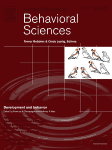Current Opinion in Behavioral Sciences
Current Opinion in Behavioral Sciences is a bimonthly peer-reviewed academic journal covering all aspects of the behavioral sciences. It was established in 2015 and is published by Elsevier as part of their Current Opinion series of journals. The editors-in-chief are Cindy Lustig (University of Michigan) and Trevor Robbins (University of Cambridge). Each issue covers a specific theme and is edited by one or more guest editors.
 | |
| Discipline | Behavioral sciences |
|---|---|
| Language | English |
| Edited by | Cindy Lustig, Trevor Robbins |
| Publication details | |
| History | 2015-present |
| Publisher | |
| Frequency | Bimonthly |
| 3.422 (2018) | |
| Standard abbreviations | |
| ISO 4 | Curr. Opin. Behav. Sci. |
| Indexing | |
| ISSN | 2352-1546 (print) 2352-1554 (web) |
| OCLC no. | 910107913 |
| Links | |
Abstracting and indexing
The journal is abstracted and indexed in Current Contents/Life Sciences,[1] Current Contents/Social & Behavioral Sciences,[1] Embase,[2] PsycINFO,[3] Science Citation Index Expanded,[1] Scopus,[4] and the Social Sciences Citation Index.[1] According to the Journal Citation Reports, the journal has a 2018 impact factor of 3.422.[5]
References
- "Master Journal List". Intellectual Property & Science. Clarivate Analytics. Retrieved 2019-01-10.
- "Embase Coverage". Embase. Elsevier. Retrieved 2019-01-10.
- "PsycINFO Journal Coverage". American Psychological Association. Retrieved 2019-01-10.
- "Content overview". Scopus. Elsevier. Retrieved 2016-02-06.
- "Current Opinion in Behavioral Sciences". 2018 Journal Citation Reports. Web of Science (Science ed.). Clarivate Analytics. 2019.